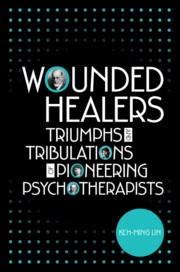Book contents
- Wounded Healers
- Advance Praise for Wounded Healers
- Wounded Healers
- Copyright page
- Contents
- Acknowledgments
- Introduction
- Part I Fin-de-Siècle Vienna
- Part II From Sea to Shining Sea
- 10 Rose Garden Revisited
- 11 The “Queer” Genius Who Shaped American Psychiatry
- 12 Anthropologists in a Daughter’s Eye
- 13 Gandhi Is Gandhi: Luther Is Luther
- 14 “My Voice Will Go With You”
- 15 Consciousness, Emotion, and Free Will
- Conclusion
- References
- Index
13 - Gandhi Is Gandhi: Luther Is Luther
How Did Erik the Vagabond Become Erikson the Guru?
from Part II - From Sea to Shining Sea
Published online by Cambridge University Press: 17 December 2020
- Wounded Healers
- Advance Praise for Wounded Healers
- Wounded Healers
- Copyright page
- Contents
- Acknowledgments
- Introduction
- Part I Fin-de-Siècle Vienna
- Part II From Sea to Shining Sea
- 10 Rose Garden Revisited
- 11 The “Queer” Genius Who Shaped American Psychiatry
- 12 Anthropologists in a Daughter’s Eye
- 13 Gandhi Is Gandhi: Luther Is Luther
- 14 “My Voice Will Go With You”
- 15 Consciousness, Emotion, and Free Will
- Conclusion
- References
- Index
Summary
Famous for concepts such as “identity crisis” and the eight life-stage psychosocial development model, Erik Erikson was born to a Jewish mother and a father whose identity was never revealed. He became a drifter and wandered the countryside for seven years before training and analysis by Anna Freud. Moving to the USA to escape Nazi persecution, he became the first child psychoanalyst in the Americas, and one of the key players of the “neo-Freudian” movement. Drawing on his own struggles with identity confusion while growing up and adjusting to American life, he wrote a series of books detailing the importance of identity in personality development and successful adjustment in life. He also coined the term “moratorium” to emphasize the need for time for adolescents and young adults to search for their own directions. His tomes on Martin Luther and Mahatma Gandhi have been bestsellers and are still regarded as classics. These books eloquently illustrate the role “identity crisis” played in shaping the lives and acts of prominent historical figures who profoundly changed the course of human history.
Keywords
- Type
- Chapter
- Information
- Wounded HealersTribulations and Triumphs of Pioneering Psychotherapists, pp. 171 - 191Publisher: Cambridge University PressPrint publication year: 2020

